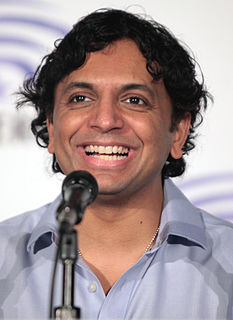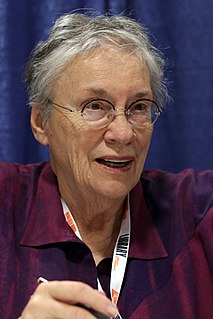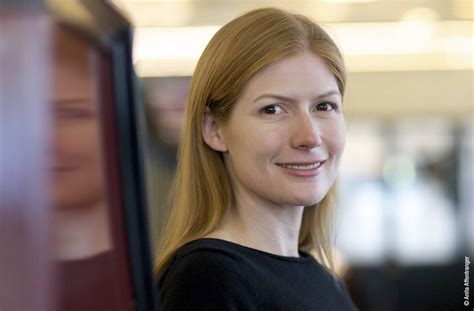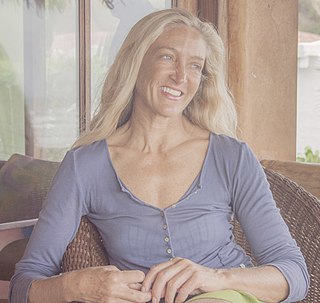A Quote by Rick Riordan
The main courtyard was filled with warriors - mermen with fish tails from the waist down and human bodies from the waist up, except their skin was blue, which I'd never known before.Some were tending the wounded. Some were sharpening spears and swords. One passed us, swimming in a hurry. His eyes were bright green, like that stuff they put in glo-sticks, and his teeth were shark teeth. They don't show you stuff like that in "The Little Mermaid.
Related Quotes
Harvey wasn't interested in the clothes, it was the masks that mesmerized him. They were like snowflakes: no two alike. Some were made of wood and of plastic; some of straw and cloth and papier-mâché. Some were as bright as parrots, others as pale as parchment. Some were so grotesque he was certain they'd been carved by crazy people; others so perfect they looked like the death masks of angels. There were masks of clowns and foxes, masks like skulls decorated with real teeth, and one with carved flames instead of hair.
We had similar interests with Derek Rowan and Paul Hewson; it sounds really pretentious at 12, 13 year old kids were like into art and poetry, but we were. We weren't into football, we were into making music or being into music and painting and stuff like that. And we called this sort of little gang Lypton Village and we made up imaginary games and this is one day we'll form bands and one day we'll make movies and one day we'll do this and one day we'll do that. A lot of kids do this in their own way, except 25, 30 years later legend happens because some of us have become quite well known.
My grandparents were classic Indian grandparents. My grandmother would put so much powder on her face that it was like a Kabuki play and she'd come down the stairs. I was like 8 or 9 years old. My grandfather apparently had no teeth because he would take out his teeth and put them in a glass, and then he would try to scare me with it. I started to try to scare them when I was a little older.
Was love then like a bag of assorted sweets passed around from which one might choose more than once? Some might sting the tongue, some invoke night perfume. Some had centers as bitter as gall, some blended honey and poison, some were quickly swallowed. And among the common bull's-eyes and peppermints a few rare ones; one or two with deadly needles at the heart, another that brought clam and gentle pleasure. Were his fingers closing on that one?
This was middle school, the age of miracles, the time when kids shot up three inches over the summer, when breasts bloomed from nothing, when voices dipped and dove. Our first flaws were emerging, but they were being corrected. Blurry vision could be fixed invisibly with the magic of the contact lens. Crooked teeth were pulled straight with braces. Spotty skin could be chemically cleared. Some girls were turning beautiful. A few boys were growing tall.
When they started to drain a swamp where birds and fish had lived, for a new housing development down the road from his apartment, Steven watched the protests and the preparations with interest. The bird people were furious, the developers unmovable, and Steven was filled with relief that the fight wasn't his. Nothing here was his... He thought there should have been something sad about how little he was tied up with the place, but instead it felt like freedom. He was free because it wasn't his water here, and they weren't his fish.
The brown blotches of the benevolent skin cancer the sun brings from its reflection on the tropic sea were on his cheeks. The blotches ran well down the sides of his face and his hands had the deep-creased scars from handling heavy fish on the cords. But none of these scars were fresh. They were as old as erosions in a fishless desert.
He shifted his weight, throwing his good leg off the bed as if he were going to try to stand. “What are you doing?” I demanded through the tears. “Lie down, you idiot, you’ll hurt yourself!” I jumped to my feet and pushed his good shoulder down with two hands. He surrendered, leaning back with a gasp of pain, but he grabbed me around my waist and pulled me down on the bed, against his good side. I curled up there, trying to stifle the silly sobs against his hot skin.
I look to everyday magic in art to remember how to live: how to estrange and vivify ordinary objects and beings. So little, really, is ordinary, but to remember this I need the brain chemical of painting and film and reading I had a thrummy doomed oracular feeling when I wrote blackened baby teeth into my little blind boy story: I saw teeth and in an instant they were becoming something else. They were buckshot. They were food. They were tiny flightless corvids.
Some years ago I was working on some forms which were vase forms with a fairly narrow base, and it was after [Hans] Coper had died that I saw an exhibition of his, a catalogue from an exhibition, and he was showing some forms which were made by cutting and joining a lot of different parts together to create what he called a spade form, which you can imagine looks a little bit like a shovel upside down.
He should have known better because, early in his learnings under his brother Mahmoud, he had discovered that long human words (the longer the better) were easy, unmistakable, and rarely changed their meanings, but short words were slippery, unpredictable changing their meanings without any pattern. Or so he seemed to grok. Short human words were never like a short Martian word - such as grok which forever meant exactly the same thing. Short human words were like trying to lift water with a knife. And this had been a very short word.
































